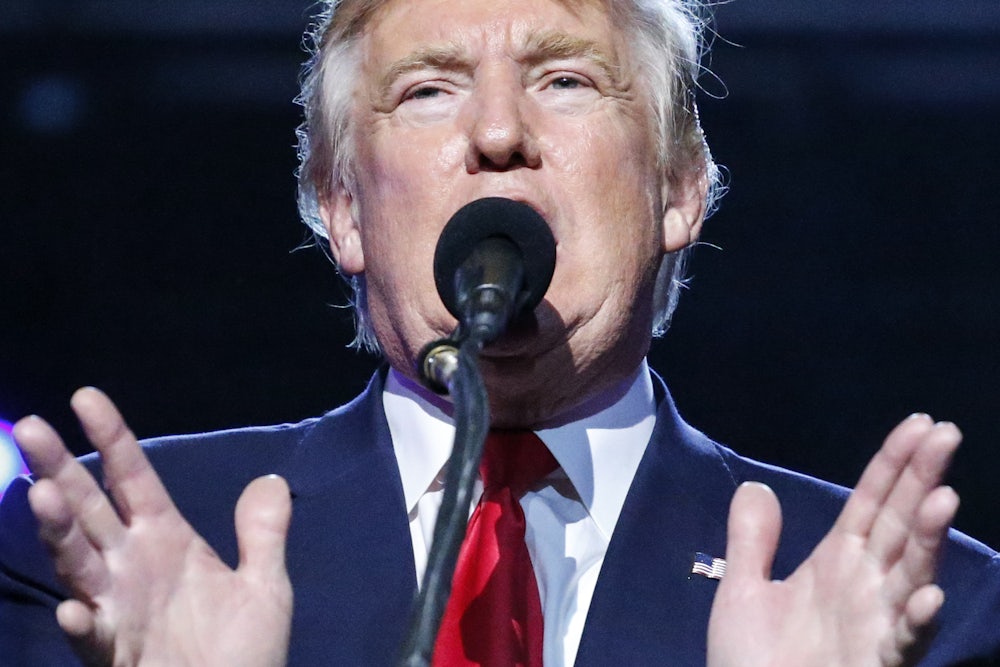Not content with pushing the pants-on-fire falsehood of widespread voter fraud, Donald Trump has a new explanation for his sinking poll numbers: “Media rigging election!”
Election is being rigged by the media, in a coordinated effort with the Clinton campaign, by putting stories that never happened into news!
— Donald J. Trump (@realDonaldTrump) October 16, 2016
The election is absolutely being rigged by the dishonest and distorted media pushing Crooked Hillary - but also at many polling places - SAD
— Donald J. Trump (@realDonaldTrump) October 16, 2016
Crooked Hillary colluded w/FBI and DOJ and media is covering up to protect her. It's a #RiggedSystem! Our country deserves better! pic.twitter.com/n2NpH3zmcy
— Donald J. Trump (@realDonaldTrump) October 17, 2016
Setting aside “stories that never happened”—the allegations against Trump are numerous, newsworthy, and appear quite credible in light of Trump’s bragging about his ability to commit sexual assault—there appears to have been an all-staff memo at the Trump campaign about this media-rigged election. It’s now the message of his running mate and surrogates across the country.
“I have no doubt the national media is trying to rig this election with their biased coverage in Hillary Clinton’s favor,” Mike Pence said Monday in Ohio. On ABC News on Sunday, Newt Gingrich—who actually contradicted Trump by saying it’s “not about election officials at the precinct level”—nevertheless said that “without the unending one-sided assault of the news media, Trump would be beating Hillary by 15 points.”
First, some clarification of terms. Unlike fraudulent voting—which, again, is incredibly uncommon—the media can’t rig an election. They don’t have it in their power. They’re not involved at polling places. They’re not infiltrating secretary of state offices. Megyn Kelly and Anderson Cooper aren’t secretly stuffing ballot boxes for the Clinton campaign.
If Trump wants to argue that the press is biased against him, a trope Republicans return to every election cycle, then fine. The media does lean left, and it’s certainly true Trump is getting more critical coverage than Clinton. Of course, in this case, it may be because he’s asked for it. He flunks every conceivable character test, flouts the norms of American democracy, and seems eager to transform America into an ethno-nationalist, quasi-fascist state.
Even if we accept the notion of media bias against Trump, differentiating that from the idea of “rigging” is important. Media bias is a mundane problem, remedied by canceling subscriptions and changing the channel. A truly stolen election would be a national emergency—and so might a widespread belief that the election was stolen, evidence be damned.
Believing the press can determine an election inflates the media’s influence, which is real but overstated—sometimes by the media itself. On Monday, Bloomberg politics reporter Mark Halperin satisfied a demand that doesn’t exist, unveiling his list of the most important people in the 2016 race:
Most key ppl in race now in order
— Mark Halperin (@MarkHalperin) October 17, 2016
1 Chris Wallace
2 Putin
3 Assange
4 @KellyannePolls
5 D Trump
6 H Clinton
7 B Clinton
8 B Obama
9 Pence
Fox News anchor Chris Wallace is the moderator of Wednesday’s final presidential debate, and thus he does play a role of some political importance. But more important than the candidates themselves?
Most journalists know better.
Writing for Nieman Lab, Jonathan Stray puts press influence in perspective, comparing the media to a “feedback loop.” “Does media attention increase a candidate’s standing in the polls? Yes. Does a candidate’s standing in the polls increase media attention? Also yes,” he wrote. “It’s not that media attention has no effect—we have good reason to believe it does ... It’s just that the media is not all powerful.”
There’s also a case to be made that the press, particularly cable television, has been too kind to Trump. His rallies have run endlessly on TV, earning him billions in free media. Networks were baited into covering a glorified infomercial for his Pennsylvania Avenue hotel in Washington, D.C. CNN is receiving well-earned criticism for paying four Trump defenders to routinely deny facts on air and engage in trolling, to the increasing frustration of the actual journalists employed by the channel.
Even if this weren’t the case, and Trump wasn’t getting his message out in mainstream media, the fact would remain that Trump has succeeded, perhaps more than any previous candidate, in bypassing the press through social media. With his 12.5 million Twitter followers and 11 million more on Facebook, it’s hard to argue he’s not getting the word out about his campaign. In fact, his social-media prowess has routinely resulted in more mainstream media coverage, feeding the beast and keeping him in the headlines.
If Trump wins the election, he might try to create a media company that could provide non-stop positive coverage of him. His son-in-law, Jared Kushner, reached out to a potential investor for a Trump TV network, according to the Financial Times. There are plenty of reasons that venture might never get off the ground, but one way or another Trump is likely to get his views heard. The audience he’s built is frightening; as a new Politico/Morning Consult poll shows, 41 percent of the country believes the election could be “stolen” from him. We’re living in an age of misinformation, making it all the more fortunate that the media—though powerless to rig an election—still has enough power to spread the truth. Whether it’s sufficiently exercising that power is another question altogether.
